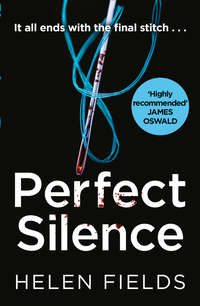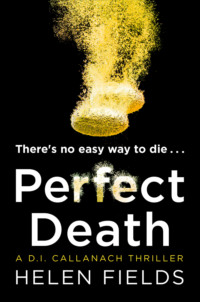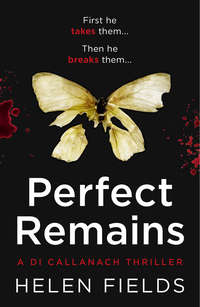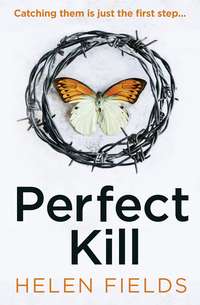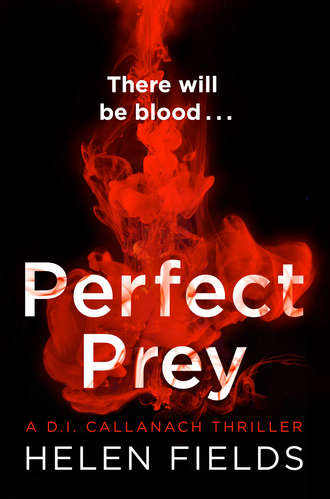
Полная версия
Perfect Prey: The twisty new crime thriller that will keep you up all night
‘Have you slept?’ Callanach asked.
‘Listen to this.’ Ava ignored his question, tearing open the newspaper she was clutching and beginning to read. ‘“Helen Lott, a forty-six year old palliative care nurse, was deliberately crushed to death in her own bedroom.” Of all the monsters I’ve ever dealt with, who would want to kill a nurse who looks after terminally ill patients? “Injuries included multiple fractured ribs and sternum, a collapsed windpipe and severe damage to internal organs, resulting in internal bleeding and asphyxiation. A neighbour alerted police after loud noises were heard coming from the property late at night. The autopsy report suggests that the murder was torturous and orchestrated to cause as much pain to the victim as possible. Mrs Lott will be sadly missed by work colleagues and patients alike, who have described her as nothing short of an angel who had dedicated her life to nursing.” Did you know there’s graffiti about the murders emerging on walls across the city? God only knows who started that off. And we’ve just been notified that concerned citizens are planning a Take-Back-The-Night-style protest march. Like we don’t have enough policing to do already. What the fuck is going on?’
‘Have you reported the leak?’ Callanach asked.
‘Of course I have. We’ve got two officers interviewing anyone with access to the information at the city mortuary, and a member of our technical services team is checking the digital route the document took from there to us to make sure the breach didn’t come from Police Scotland’s end. On top of that, all the usual media outlets have been contacted to see if anyone approached them offering the article for money. No joy there so far. Why is the first thing that happens always the last thing you need?’ Ava huffed.
‘You want coffee?’ he asked.
Ava shook her head. ‘Sorry about yesterday. With Joe. It was …’ her voice dwindled.
‘None of my business,’ Callanach said.
‘Joe and I were friends at University. He phoned me a few weeks ago to say he was likely to be posted here. You know how sometimes you just pick things up where you left them as if no time had passed at all …’
‘Forget it. You want to get something to eat on the way home? If I don’t get a shower soon my clothes are going to sue me for hygiene abuse.’
Ava looked down at her hands.
‘It’s fine,’ Callanach said, Ava’s unspoken plans hanging in the air between them. ‘I’ll catch you tomorrow. And don’t worry about the papers. New story every day, remember?’
That turned out to be good advice. In spite of the endless coverage afforded by two murders in one night, the media headlines the next day focused on an altogether different target.
The largest incident room was taken up with an array of well-dressed plain-clothes officers, freshly washed and scrubbed, who obviously had not been up all night watching endless mobile phone footage and scanning photos with no results.
‘Something happen overnight?’ Callanach asked Sergeant Lively as he passed by.
‘Fuckin’ snobby idiots strutting around, acting like they own the place. Hunting a bunch of nerds no one in their right mind gives a damn about. Makes you look almost like a frigging native.’
‘Look almost like a frigging native, sir,’ Callanach reminded him. Lively sniggered.
‘Aye, whatever.’ Lively wandered off, stuffing a sandwich into his mouth. Callanach and he hadn’t hit it off since day one. A long-in-the-tooth sergeant with decades in the job, Lively had his own preferred candidate pegged to fill the role of Detective Inspector when Callanach had transferred in. It was a fair assumption that Lively had overseen a campaign of piss-taking posters and nasty rumours that had undermined Callanach until he nailed his first case with Police Scotland. He and the detective sergeant had finally progressed from coming close to blows, to tolerating one another, although the verbal abuse hadn’t stopped. At least the influx of Scotland Yard’s finest had provided a favourable comparison.
Callanach’s phone was ringing as he reached his office. He took the call as he threw his jacket onto the desk. It was too hot for any sane person to be wearing more than shorts and a T-shirt. Shirts and ties were one of the drawbacks of promotion.
‘Callanach,’ he said.
‘DI Callanach, I’ve left several messages for you,’ was the opening line. ‘This is Lance Proudfoot. I’m the editor of an online news and current affairs blog. I was hoping to get a statement about the festival murder.’
‘How did you get this number?’ Callanach asked.
‘Switchboard put me through.’
‘That’ll be a career-shortening decision then,’ Callanach said, imagining the conversation he’d be having later with the idiot who had answered the phone. ‘No statements. You had everything we’re giving out at the press conference.’
‘To be fair to the young lady on your switchboard, I may have given the impression that I was a family member,’ Lance said. Callanach sighed. ‘And your media office occasionally forgets to invite the online press to your conferences, hence the need for a certain level of … inventiveness about sourcing information.’
‘I’m not sure you and I are equally content to supplement the word inventiveness for the term lying, Mr Proudfoot. And I’m afraid I have to get on with some work,’ Callanach said.
‘So you can’t comment on last night’s hacking scandal either then? Only I heard that Scotland Yard had sent a crack team of investigators to Edinburgh.’ The last phrase was heavily laced with sarcasm. It was all Callanach could do to stop himself agreeing. Instead, he opened a news site on his mobile and scanned the headline. A group calling themselves The Unsung had hacked into the accounts of various bankers and investors recently awarded some jaw-dropping bonuses, and transferred the funds. ‘Brilliant bit of anti-establishmentarianism,’ Lance continued.
‘Looks like plain old theft to me,’ Callanach replied.
‘I beg to differ. The hackers transferred the funds into the accounts of several good causes, anything from children’s hospices to animal shelters. Only took twenty-five per cent of each bonus, too, so they weren’t even greedy about it. They were just making a point about the obscenity of the highest paid compared to the desperate underfunding of non-profit-making causes,’ Lance said.
‘Well, it’s not a Major Investigation Team case, I’m afraid, so yet again, no comment,’ Callanach said, itching to put the phone down, only the journalist on the other end was proving remarkably hard to get rid of politely.
‘Ah, so they have called in the cavalry. Doesn’t surprise me at all,’ Lance said. Callanach mentally kicked himself for his indiscretion. ‘Take benefits away from single mums and the disabled and there’s not one politician available for comment. Nick some cash from a load of fat cats and the government mobilises.’
‘It’s still a criminal offence. We don’t get to make judgement calls about the morality of the crimes we investigate,’ Callanach said.
‘You’ve got to admit it was clever though. Now the losers have to report each unauthorised money transfer as a crime, which is how the press gets the details of the offences. Then the so-called victims have to ask for their money back from each charity. What would you do, DI Callanach? Say you got a four million pound bonus on top of already inflated wages, three million is still in your bank account. You going to make a spectacle of yourself and insist that the local war veterans’ society gives you your million back? Named and shamed doesn’t even start to describe how little love the public have for these guys. Quite some stunt, isn’t it?’
Callanach didn’t answer. Quite some stunt indeed. It certainly explained the peacocking going on in the incident room.
‘Anyway, I’m just after one comment on the record,’ Lance continued. ‘The public want to know that their city is safe. Will you not take the opportunity to reassure them?’
‘This is a murder investigation,’ Callanach said. ‘Not a game and not a publicity opportunity. Have some respect.’
‘Listen, I do this because I care about getting news stories out. I don’t work for a paper that’ll edit my words to meet the owner’s political agenda, or to maximise advertising revenue potential. I’m my own boss and I take responsibility for what I write. Do me a favour. Just one line. We’re not all bad, you know.’
Callanach brought up Lance Proudfoot’s online profile. His news blog had nearly one hundred thousand followers and it looked as if his feed was picked up by some of the bigger media outlets. He sighed. It was worth keeping the popular press onside. And there was always the possibility that it might actually prove useful.
‘Fine,’ Callanach said, feeling resigned. ‘But unnamed. An anonymous source inside the police. The festival attack appears motiveless. Whilst the majority of murders are committed by persons known to the victim, this does not appear to be the case. We ask the public to remain vigilant and for anyone with any information to come forward as soon as possible.’
‘That’s all?’ Lance asked.
‘Don’t push your luck,’ Callanach said. ‘Use my name and we never talk again.’
‘Does that mean I can call you if I have more questions?’
‘No, it doesn’t. And the next time you lie to switchboard to get put through, I’ll have you arrested.’ Finally common sense kicked in and Callanach hung up, flicking back to the news headlines and reading the hacking story more thoroughly.
Ava’s friend DCI Edgar was going to have his work cut out wading through the mire of public relations mud about to rain down. The Unsung may have committed grand scale fraud and theft, but it was hard to imagine many people condemning them. And it was a big enough story, just about, to deflect the media’s attention and provide some breathing space while they made headway on the murders. Couldn’t have happened to a nicer guy, Callanach thought, wondering how long Joe Edgar would be using Edinburgh as an investigative base. He reached for his coffee and for an unlit Gauloises cigarette to suck.
Chapter Six
DC Christie Salter wished Callanach a quiet goodnight and went home to her new husband. She’d put off taking her sergeants exam for her wedding and honeymoon. When Callanach had advised against making the sacrifice, she’d laughed. Max Tripp went home to his twin brother with whom he was flat-sharing. The Chief went home to a wife who had tolerated him for no fewer than thirty years. Even miserable Sergeant Lively had someone waiting for him to get home so they could share a meal and stare at a mutually chosen television programme and forget the outside world.
Callanach retreated to an empty flat.
Scotland had been a new start for him, returning to the land of his long since dead father. But it had meant shedding the social circles and family comfort that had been at the centre of his world. He was trying, certainly. There was the gym, work, a good wine shop, places where people knew his name and greeted him with a smile. Beyond that, replacing old friends with new was time-consuming and soul-destroying.
He fired up the computer, waiting for his emails to appear and hoping desperately for contact from his mother. There was also the matter of checking that Astrid Borde had not been in touch. Since she’d falsely accused him of rape when they’d worked together at Interpol, then followed him to Scotland, he had worried every day that the nightmare might begin again. It hadn’t mattered that the rape allegation was entirely a figment of Astrid’s twisted imagination and a symptom of her obsession with him. The stigma of it had stuck. People he’d worked with for years avoided him. His closest friends grew guarded, then distant, finally disappearing altogether. Innocence, he had learned, was a technicality when sexual assault was involved. However many times he told himself to live in the moment, there was little escape from the impact of the past. Not when it still affected him as physically as it did.
Too restless to sleep and too tired to go out, Callanach checked out Lance Proudfoot’s online news blog again. He found a brief section outlining Proudfoot’s career history with publications in the US and Canada, as well as some of the larger British newspapers. His news coverage wasn’t bad. Less sensational than the tabloids, and less prone to navel-gazing than some of the broadsheets. There was an interesting editorial piece on the hacker thefts, with a side piece on the National Cyber Crime Unit, largely highlighting how far behind the offenders’ capabilities the police were, given the budget constraints and compared to the sort of money the gifted could earn in the private sector. DCI Joseph Edgar’s name popped up briefly and Callanach checked him out for something to do. Public school, followed by a law degree, chair of the debating society, with interests in cricket and rugby. Never married, steady career path. Callanach picked up his mobile to text Ava. He was halfway through it when there was a knock at his door. It was late, much later than he was used to being disturbed. Not that anyone ever knocked on his door.
‘Who is it?’ he called as he walked slowly through his lounge. There was no reply. Callanach peered through the spyhole. In the corridor he could hear banging then rattling, but no visible person. Searching for a blunt weapon, he selected a knife sharpener from the kitchen and made his way back to the door. More frantic noises came from the area just out of the visual field of the spyhole. Callanach slid the bolt back as quietly as he could and stepped out, weapon raised.
‘Please don’t hurt me!’ the girl in the corridor screamed, arms raised, falling backwards against the wall.
Callanach dropped the sharpening steel and raised his own hands.
‘It’s all right,’ he said. ‘I’m a police officer. Are you hurt? Was it you who knocked my door?’
The woman began to laugh, breathing fast, somewhere between terrified and amused.
‘Yes, that was me. You didn’t answer, so I assumed there was no one in. And no, I’m not hurt. I just moved into the flat opposite yours,’ she said, pointing at the only other door on the same level as Callanach’s in the converted house. His new neighbour was tall and slim, with blonde hair tied up in a ponytail and a broad smile. ‘All my fuses have blown. I’ve absolutely no idea where the fuse box is so I was trying the loft hatch in case the box is up there. I figured, if your layout was the same as mine you might be able to help me. I’m so sorry. I obviously scared you.’
‘No, I’m sorry. Just being overcautious. Of course I’ll help. The fuse box will be in your airing cupboard. I’ll fetch a torch.’
A few moments later he was inside the flat opposite his own, reaching into the top of the cupboard, flipping open the plastic cover, and there was light.
‘Nice to meet you,’ she said, thrusting a hand out towards Callanach. ‘I’m Bunny. My real name’s Roberta, but my little sister couldn’t say that when we were growing up. She called me rabbit, hence the nickname, and it kind of stuck. Thanks for helping. And I’m talking too much. Listen, I haven’t got much in, but can I at least get you a beer? Plenty in the fridge.’
‘I should go,’ Callanach said, glancing at his watch. ‘You should really get a chain put on your door.’
‘I will, especially living alone. What about you?’ Bunny asked.
‘I have a chain …’
‘No, I meant do you live alone?’
Callanach paused as Bunny opened the fridge door. By the time he’d figured out how to answer, she was pushing a cold bottle into his hand.
‘Yes,’ he said. ‘I live alone. But I’m not at home very often, so you should really make sure that you have proper security in place.’
‘I’ll remember that. Feel better knowing you’re just over the corridor though.’ She waited for him to say something and Callanach realised he hadn’t introduced himself.
‘Callanach,’ he said. ‘Luc.’
‘That’s foreign, right?’
‘French,’ he said.
‘Oh my God. My mates are just going to die when they meet you. Well, slàinte, good health, Luc Callanach,’ she said, clinking the neck of her bottle against his. ‘Here’s to many an evening spent with a beer in hand and a friend to share it with. So tell me about you. Lived here long?’
‘Not that long,’ Callanach replied, looking around. The apartment was full of boxes, most overflowing with clothes, electrical gadgetry and accessories. Unpacking was going to take a while.
‘Messy isn’t it?’ she said, following his eyeline and kicking a couple of boxes shut. ‘I’m so busy with work I couldn’t stop to unpack properly. I’m a hair and make-up artist. Anything from weddings to films. You should be an actor with that face.’
‘The police service doesn’t approve of moonlighting,’ Callanach said quickly. ‘And I’ve got to be back on duty in a few hours so I really should go now. Thank you for the beer.’
‘Being a policeman must be exciting. And those poor people killed this week. Awful, wasn’t it?’ Callanach made his way back out into the corridor. ‘Listen, we’re neighbours. Let me give you my number, in case you need anything.’ Before he could stop her, she grabbed a pen from her pocket followed by his hand and began scribbling on it. Callanach fought the urge to pull away. ‘There’s my number. I’m a terrible sleeper so call any time. It’s going to be fun living here, I can already tell.’ It took another ten minutes to get away.
There was an email from Tripp when he got back into his own flat. ‘Sir, on my way over. Couple of video files you might want to see tonight.’ It was timed fifteen minutes earlier. Callanach threw dirty plates into the dishwasher and closed some doors. He was waiting for Tripp to knock when he heard voices in the corridor. Evidently Bunny hadn’t shut her door since he’d left and had found Tripp before he’d had a chance to reach Callanach.
‘Constable,’ he said, sticking his head out. ‘I gather this is urgent. We should get on.’
‘Sorry, Luc,’ Bunny shouted. ‘We got chatting. He’s sweet, he is.’
Tripp looked like he didn’t know which way to run.
‘In you come, Tripp,’ Callanach instructed. ‘And you should shut your door, Bunny. It’s late.’
Safely inside, Tripp was a shade of beetroot.
‘New neighbour then, sir? She seems very, um, enthusiastic.’ Tripp raised his eyebrows and seemed to be struggling to control a grin.
‘Was there something important, detective constable? Only I was hoping to get some sleep for the first time in several days.’
‘Of course, yes. Couldn’t send the files over the internet. No time to securely encode them. Here you go.’ Tripp opened a laptop, and clicked on a folder in which two items sat. As the first played, Callanach could hear the now familiar song that the band had been playing when Sim Thorburn had hit the floor. The footage was taken from a few rows in front of the victim, on a mobile phone whose owner was obviously taking a selfie of herself singing along. For a split second, in the background, a shadow passed across Sim’s face. As the shadow cleared the screen, Sim could be seen slightly out of focus, looking down towards his stomach, his face registering confusion. Then he lurched to one side, out of shot.
‘Is that all?’ Callanach asked. ‘It doesn’t tell us any more about the attacker.’
‘One more piece of footage,’ Tripp said. ‘Top right-hand corner of the screen.’
Tripp pressed play. More mobile footage, this time obviously designed to show the scale of the audience, mobile held high in the air, turning around in a three-sixty loop. After a few seconds, Tripp pressed pause and pointed.
‘There,’ he said. ‘Only in shot for a second, but it’s clearer than in the previous footage.’
Callanach looked more closely. Sim Thorburn was hidden from view, but he could see Merel and Niek De Vries. To the left of them, walking in profile, was an adult with dark brown hair flopping over their face. The attacker was wearing large, dark sunglasses. Tripp let the video play to show the person’s sudden change of direction away from the camera and into the crowd.
‘Male or female?’ Callanach asked.
‘Can’t be sure,’ Tripp replied, closing the lid of the laptop. ‘But not that tall, slim and therefore able to move about relatively unnoticed. Caucasian. Hair could be natural or dyed. Might even be a wig. Clothes didn’t stand out to anyone, so no help there.’
‘Perfect camouflage,’ Callanach said, leaning back on the couch and closing his eyes.
‘Could it be someone from one of the homeless shelters, do you think?’ Tripp asked. ‘Sim would have come into contact with plenty of people suffering mental health problems. No one keeping tabs on them, no one to recognise them.’
Callanach shook his head.
‘I wish I believed that, Max,’ he said. ‘Because sooner or later the person you’re describing would get arrested for something else, have a breakdown and confess, get drunk and show someone the knife. This took planning. It needed care and consideration. More than that, it needed nerves of fucking steel. Can you imagine the psyche of a person who can walk through a crowd of thousands, take out a weapon, cut hard and deep and precisely, then not rush away? To walk on slowly through the crowd, certain you’ve done such a good job that you have the time to get out of there, whilst putting the knife out of sight, making sure you don’t emerge from the crowd covered in blood. This person knew how to cut. They may be a psychopath but they’re not mentally ill, not in the way we think of it. This is someone who feels nothing at all. No panic, no fear, no sense of danger. Nothing at all.’
‘How do we catch them then, sir, if they’re that good?’ Tripp asked.
‘You know what, Tripp? I don’t have a fucking clue.’
Chapter Seven
Begbie’s complexion was waxy and grey. Callanach saw Ava’s expression as they went in for a briefing, and knew she was worried too. Ailsa Lambert joined them seconds later.
‘For Heaven’s sake, what have you been eating, man?’ Ailsa screeched, walking over to the chief and staring closely at his skin, suffering none of Ava and Callanach’s reticence.
‘Don’t start on me, Ailsa,’ Begbie said. ‘It’s not as if I’ve got time to get on the running machine.’
‘You’ve enough time to consume high levels of fats and sugars by the looks of it. How much are you drinking?’
‘Can we not do this in front of my detective inspectors, if you don’t mind? We’ve other matters to discuss,’ Begbie grumbled.
‘You won’t be discussing anything unless you make some changes. The next conversation we’ll be having will take place with you lying motionless on a slab and me speaking into a voice recorder,’ Ailsa said.
‘You’ve had your say. Now would you take a seat?’ Begbie pointed to a chair.
Ailsa mumbled to herself but sat anyway, pulling a tablet out of her bag and tapping it furiously. ‘Morning, you two. Seems like we’ve been here before. Who wants to go first?’ Neither of them had time to answer before she continued, ‘Helen Lott. Crying shame. I know some doctors she’d worked with. Great loss to the city, this one. There aren’t many who can do her job. Vast amount of force used, trauma unlike anything I’ve ever seen deliberately caused. Horrible way to die, she’d have felt all of it. The good news is that we believe we have his DNA.’
Ava muttered what might have been thanks to some unidentified deity, then cut in, ‘Has it been run through the system?’
‘It has. No hits I’m afraid, but we can tell you that it’s from a male Caucasian. At least if you arrest any suspects, we’ll be able to confirm a positive identity. Other than that the crime scene was clean. No fingerprints. Gloves were definitely worn. No hairs that we’ve found,’ Ailsa said.
‘Where was the DNA?’ Ava asked.
‘On her forehead, just at the hairline. There was a droplet of saliva mixed in with a little blood. At some point, he leaned over her face, was obviously overexcited, and dribbled or spat, possibly whilst talking to her or watching her. I suspect he’d bitten his tongue or cheek, hence the blood cells. Definitely wasn’t from the victim and it was fresh, so it was from someone in the room with her as she died.’ The pathologist pulled out duplicate copies of photographs and handed one bundle to Ava and another to Begbie. ‘You can see from the photos that it was a frenzied attack, but I’d say planned in advance. Killer probably lost control in the middle of it. Initially, she received a blow to the face, hard enough to cause her to fall and prevent her from defending herself. Then the chest of drawers was placed on top of her, and I mean placed rather than randomly pushed. It was central to her body, well balanced, stopped her from getting up. The positioning caused maximum damage to her vital organs. Looks as if her ribs broke first, then her sternum was fractured when additional weight was applied. The pressure to her stomach made the poor woman vomit, adding to the asphyxia she was already experiencing from being unable to draw breath into her lungs. She had a variety of other limb fractures, and body-wide contusions. One of the broken ribs pierced her right lung, speeding up death and by then she was probably grateful for it. Her internal organs were fatally damaged at that stage. Internal bleeding was extensive, as you’d expect. She lost control of her bowels pretty much as she died. Just moving the drawers would have taken a tremendous amount of strength. You’re looking for someone very large, possibly who weight trains, works out regularly. Someone who was there for the specific purpose of making his mark.’


